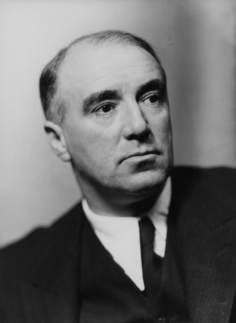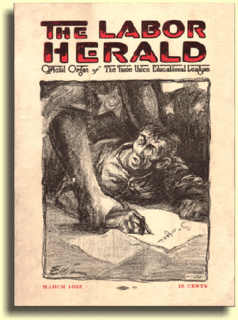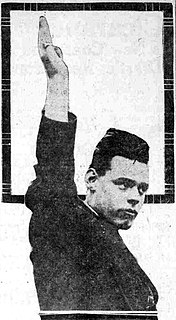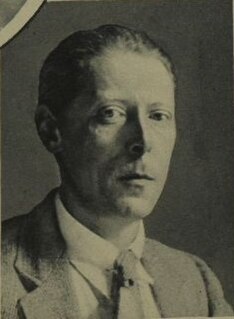Establishment
The National Minority Movement was established at a convention held on 23–24 August 1924, attended by 271 delegates, claiming to represent 200,000 workers. [1] By the time of the NMM's formation in 1924, the Comintern had abandoned strategies based on the prospect of an imminent world revolution, in favour of slow, gradual working within established institutions, including "pure and simple" reformist trade unions. The aim of the NMM was to convert the revolutionary minority of the working class into a majority. The NMM would organise workers who were dissatisfied with the existing unions but unwilling to join the Communist Party as well as those who were already party members. The Communists would thus increase their influence in workers without splitting the existing organisations.
The NMM was affiliated to the Red International of Labour Unions (RILU). Its president, from 1924 to 1929, was the veteran trade union activist Tom Mann and its General Secretary, over the same period, was Harry Pollitt. Other prominent figures included Wal Hannington, in charge of organization of the metal workers until transferred by the party to work organising the unemployed, the engineer J. T. "Jack" Murphy and coal miners A. J. Cook, Arthur Horner and Nat Watkins.
The Organising Secretary of the NMM was George Hardy, and George Fletcher served as Treasurer. [2]
The organisation appears to have been modelled after the American Trade Union Educational League, established by Communist trade union leader William Z. Foster in 1921. Both were divided into trade-related sections, the most important of which were the Mining MM (headed full-time by Watkins), the Metal Workers' MM (headed by Hannington), and the Transport MM (headed by Hardy). [3]
An early success of the movement was the election of Minority Movement supporter A. J. Cook as General Secretary of the Miners Federation of Great Britain. [4]
Development
In January 1925, the NMM organised a conference on international trade union unity, attended by 617 delegates, representing 600,000 workers. [5] Even though the RILU had softened its militant rhetoric calling for the destruction of the social-democratic Amsterdam International of trade unions, most of the Amsterdam International Federation of Trade Unions (IFTU) was in no mood to parlay with the Communist unionists from around the world, demanding that their affiliation with RILU be terminated before they could be accepted. [6] Even though Soviet trade union chief Mikhail Tomsky went so far as to say that Soviet unions should consider affiliation with the Amsterdam International in a speech delivered in December 1925, no such union was forthcoming. [7]
The 2nd Annual Conference of the National Minority Movement was held on 29 and 30 August 1925. The gathering was attended by 683 delegates, claiming to represent 750,000 workers. [8] The Communist Party was pleased with the tremendous growth which the organisation seemed to be showing and NMM leader Harry Pollitt expressed optimism that his organisation could "capture" the Trade Unions Congress in fairly short order if it continued to develop along its current path. [9]
In January 1926, a special meeting of the CPGB's Central Committee called for a renewed offensive of the working class against the capitalist state and the established organized labour movement. [10] A special "National Conference of Action" was called for March of that same year, a gathering which was attended by 883 delegates from organizations claiming to represent 957,000 workers. [11] The Miners' Minority Movement was particularly militant, propagandizing all branches of the Miners' Federation for the complete rejection of the Report of the Samuels Commission on the coal industry, which proposed wage reductions and reorganisation of the industry without nationalisation. [12] The stage was set for a chain of events, which would culminate in the 1926 British General Strike.
In 1927, Percy Glading—later to be arrested and imprisoned for his role in directing the Woolwich spy ring, which passed military secrets to the Soviet Union—was elected NMM national organiser. [13] [14]

Harry Pollitt was a British communist who served as the General Secretary of the Communist Party of Great Britain (CPGB) from 1929 to September 1939 and again from 1941 until his death in 1960. Pollitt spent most of his life advocating communism. Ideologically a Marxist-Leninist, Pollitt was an adherent particularly of Joseph Stalin even after Stalin's death and disavowal by Khrushchev. Pollitt's acts included opposition to the Allied intervention in the Russian Civil War and Polish–Soviet War, support for the Spanish Republicans during the Spanish Civil War, both support and opposition to the war against Nazi Germany, defence of the communist coup in Czechoslovakia, support for the 1956 Soviet invasion of Hungary, and criticism of British colonialism.

The Workers' Socialist Federation was a socialist political party in the United Kingdom, led by Sylvia Pankhurst. Under many different names, it gradually broadened its politics from a focus on women's suffrage to eventually become a left communist grouping.

The Communist Party was a Left Communist organisation established at an emergency conference held on 19–20 June 1920 at the International Socialist Club in London. It comprised about 600 people.
The Red International of Labor Unions, commonly known as the Profintern, was an international body established by the Communist International with the aim of coordinating Communist activities within trade unions. Formally established in 1921, the Profintern was intended to act as a counterweight to the influence of the so-called "Amsterdam International", the social democratic International Federation of Trade Unions, an organization branded as class collaborationist and an impediment to revolution by the Comintern. After entering a period of decline in the middle 1930s, the organization was finally terminated in 1937 with the advent of the Popular Front.

The Trade Union Educational League (TUEL) was established by William Z. Foster in 1920 as a means of uniting radicals within various trade unions for a common plan of action. The group was subsidized by the Communist International via the Workers (Communist) Party of America from 1922. The organization did not collect membership dues but instead ostensibly sought to both fund itself and to spread its ideas through the sale of pamphlets and circulation of a monthly magazine.
John Thomas Murphy was a British trade union organiser and Communist functionary. Murphy is best remembered as a leader of the communist labour movement in the United Kingdom from the middle 1920s until his resignation from the Communist Party of Great Britain in 1932.

Walter "Wal" Hannington (1896–1966) was a founding member of the Communist Party of Great Britain and National Organiser of the National Unemployed Workers' Movement, from its formation in 1921 to its end in 1939, when he became National Organiser of the Amalgamated Engineering Union.
John Gordon Michael Lawrence was a leading far-left activist in a wide variety of groups in Britain.

Albert Samuel Inkpin, was a British communist and the first General Secretary of the Communist Party of Great Britain (CPGB). He served several terms in prison for political offences. In 1929 he was replaced as head of the CPGB and made head of the party's Friends of Soviet Russia organisation, a position he retained until his death.

John Ross Campbell (1894–1969) was a British communist activist and newspaper editor. Campbell is best remembered as the principal in the so-called Campbell Case. In 1924, Campbell was charged under the Incitement to Mutiny Act for an article published in the paper Workers' Weekly. Campbell called on British soldiers to "let it be known that, neither in the class war nor in a military war, will you turn your guns on your fellow workers, but instead will line up with your fellow workers in an attack upon the exploiters and capitalists."
Idris Cox was a Welsh communist activist and newspaper editor.

The British Socialist Party (BSP) was a Marxist political organisation established in Great Britain in 1911. Following a protracted period of factional struggle, in 1916 the party's anti-war forces gained decisive control of the party and saw the defection of its pro-war right wing. After the victory of the Bolshevik Revolution in Russia at the end of 1917 and the termination of the First World War the following year, the BSP emerged as an explicitly revolutionary socialist organisation. It negotiated with other radical groups in an effort to establish a unified communist organisation, an effort which culminated in August 1920 with the establishment of the Communist Party of Great Britain. The youth organisation the Young Socialist League was affiliated with the party.

The Communist Party of Great Britain (CPGB) was the largest communist party in Great Britain between 1920 and 1991. Founded in 1920 through a merger of several smaller Marxist parties, the CPGB gained the support of many socialist organisations and trade unions following the political fallout of the First World War and the Russian October Revolution. Ideologically the CPGB was a socialist party organised upon Marxism–Leninist ideology, strongly opposed to British colonialism, sexual discrimination, and racial segregation. These beliefs led many leading anti-colonial revolutionaries, feminists, and anti-fascist figures, to become closely associated with the party. Many prominent CPGB members became leaders of Britain's trade union movements, including Jessie Eden, Abraham Lazarus, Ken Gill, Clem Beckett, GCT Giles, Mike Hicks, and Thora Silverthorne.
Jack Villiers Leckie was a Scottish communist activist.
John Mahon was a British communist political activist.
David Ramsay (1883–1948) was a British socialist activist.

Far-left politics in the United Kingdom have existed since at least the 1840s, with the formation of various organisations following ideologies such as Marxism, revolutionary socialism, communism, anarchism and syndicalism.
George Peet was a British communist activist and trade unionist.
Richard Clyde Beech (1893–1955) was a revolutionary industrial unionist. He was the delegate for the Industrial Workers of the World (IWW) to the 2nd World Congress of the Comintern.

Benjamin Francis Bradley (1898–1957), also known as Ben Bradley, was a leading British communist and trade unionist who was accused of attempting to overthrow the British colonial authorities in India, leading to him being sentenced in the Meerut Conspiracy Trial. His imprisonment in 1929 provoked an enormous outcry, and in Britain, according to Stephen Howe, "probably inspired more left-wing pamphlet literature than any other colonial issue between the wars". He was also a key member of the Communist Party of Great Britain (CPGB).









